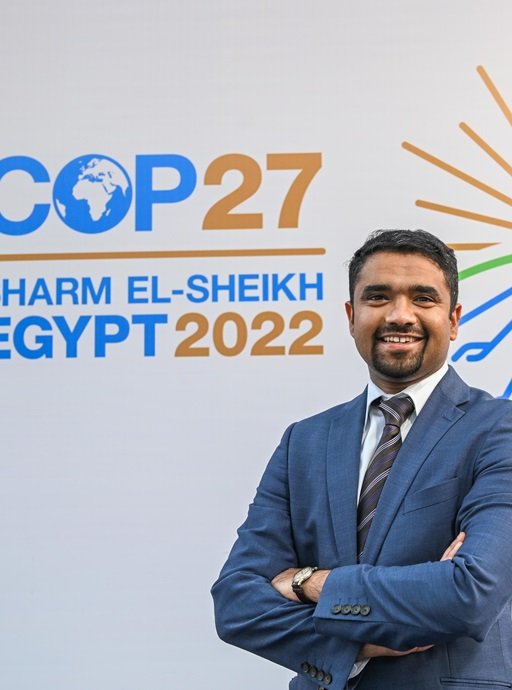Dhanush Dinesh is the Chief Climate Catalyst of Clim-Eat, a think and do tank for food and climate which he founded at COP26. Clim-Eat seeks to accelerate food systems transformation under climate change by serving as a bridge between the food and climate communities, mobilising knowledge and connecting it to action through policy and practice.
- Share this article
- Subscribe to our newsletter
Time for meaningful change
It’s that time of the year again – the United Nations’ COP climate summit is imminent. I first heard about these annual events in 2009, with COP15 in Copenhagen. It was dubbed “HOPE 15”, such was the optimism. Like many, I was looking forward to the moment COP saved the planet. Thirteen COPs later, I’m still waiting.
This is despite another burst of optimism at COP21. Now, this, I thought, will be the moment we save the planet, and I was thrilled when the Paris Climate Agreement was negotiated. For the first time, there was a legally-binding international treaty on combating climate change. Unfortunately, the Global Stocktake, which tracks progress towards the Paris goals, shows we are not on track to limit global warming to 1.5 degrees Celsius. So, a further failure.
Now, COP28 is being touted as yet another potential breakthrough moment, this time for recognising the importance of food systems in tackling climate change. Rumours suggest the host country, the United Arab Emirates, will also launch an initiative on Regenerative Landscapes. I’m doubtful this will achieve much.
That’s because from all of the COPs I’ve attended, one key thing is guaranteed – and it’s neither action or impact. Instead, you can be sure there will be lots of organisations trying to make themselves look good. Whether you’re the Presidency (host country), a UN agency, an NGO (like Clim-Eat), or a commercial enterprise, making yourself look good at COP often means launching or showing support for something new – like an initiative. And boy, we’ve seen plenty of those over the years.
Launching an initiative is a chance to say all the right things and demonstrate in front of a global audience that you want a better future too. It’s an opportunity for a news hook, a media moment, and hopefully favourable coverage. But once the fanfare has passed, and the summit participants have all gone home, how many COP initiatives have lived up to their promise? Here are a few that seem to have been quietly ushered out of the spotlight:
COP21 (2015) – 4 Per 1000. This sought to boost carbon storage in farmland by 0.4 per cent each year and brought over 40 countries together under the leadership of the French Presidency. But eight years later, has the initiative delivered? Its website talks about the partners, countries, and producer organisations engaged, but not the carbon sequestered.
COP22 (2016) – Adaptation in African Agriculture. This Morocco-led initiative was meant to accelerate climate change adaptation and mobilise 30 billion US dollar of investment. This hasn’t happened; the initiative’s website doesn’t even mention this goal anymore.
COP23 (2017) – Koronivia Joint Work on Agriculture. This UN Framework Convention on Climate Change (UNFCCC) initiative aimed to bring about climate action in the agriculture sector. But it has achieved little, beyond multiple workshops and submissions of views, resulting in the Sharm El Sheikh Joint Work on Agriculture, which proposes the development of – wait for it – an online knowledge-sharing portal. I mean, seriously?!
COP26 (2021) – Policy Action Agenda; Global Action Agenda for Innovation in Agriculture; Glasgow Agriculture Breakthrough. So many initiatives launched in one single summit! These sought to repurpose harmful agricultural subsidies into positive outcomes for the planet, leverage greater investment for innovation in agriculture, and achieve scale with sustainable practices. To be fair, the UK invested in these, and ensured follow up, but the results are simply not showing.
COP27 (2022) – Food and Agriculture for Sustainable Transformation. This is an initiative I’m personally invested in. It came from a strong desire from the Egyptian Presidency to accelerate climate action. But progress is disheartening – the initiative aimed to improve the quantity and quality of climate finance to food and agriculture, but so far nothing more than meetings have taken place.
We have to ask whether it is worth investing so much time and money developing these initiatives when they achieve so little – beyond just making those who launch them look good. That’s why, in the lead up to COP28, I’m calling on the UAE Presidency, and participants to shift the discussion to results, because climate change responds to actions, not words. I’m calling on them to come and share the results of the initiatives they either launched or committed to, and share what did and didn’t work.
That way we might learn how to do things better and set ourselves up to actually achieve meaningful change. That, for me, would be a much better look.
Contact: dhanush(at)clim-eat.org





Add a comment
Be the First to Comment